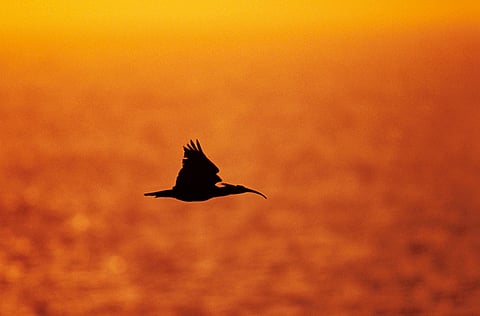On track to save the ibis
Endangered birds in the Middle East fitted with satellite tracking devices

With its long red beak and wrinkled face, it's not the prettiest of birds, but researchers are desperate for a glimpse of the Northern Bald Ibis, which is on the verge of extinction. So much so that four of the remaining nine birds in Syria, which nest in almost inaccessible cliffs, have been fitted with special tracking devices.
Depicted as a hieroglyph by the ancient Egyptians, the ibis had not been spotted in the wild in the Middle East for about 70 years until researchers discovered seven birds nesting near the ancient city of Palmyra in 2002.
Since then the Syrian Government's Desert Commission and supporting conservationists toiled to preserve this tiny population but the number dwindled to three. Keen to help save the colony from oblivion, the Turkish government donated six semi-captive birds to Syria, hoping their introduction would swell the precariously small wild population.
Once widespread across North Africa, Southern and Central Europe as well as the Middle East, the only other nesting population of about 100 breeding pairs of Geronticus eremita - the Latin name for ‘hermit' because of the birds' cliff-side homes - lies in Morocco.
The reasons for the species' long-term decline are not clear, say experts, but hunting (the ibis was considered a delicacy in parts of Europe) and loss of foraging habitat may have contributed to the rapid loss of colonies in recent decades.
Conservationists now fear unrest in Syria could have a detrimental effect on these sensitive birds.
The UK-based Royal Society for the Protection of Birds too joined the act to preserve and boost the numbers and devised a programme involving attaching satellite tracking devices to the backs of two adults and two chicks in Syria.
The data received revealed the migration route of the adults - named Odeinat and Salama - crossing eight countries and spending the winter in the highlands of Ethiopia. They're still working on deciphering the data for the two young birds but hopes for their survival are flying high.
For more info: www.rspb.org.uk/wildlife/tracking/northernbaldibis/


